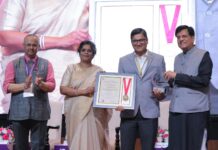
In a first reported case across the globe, Fortis Hospital Cunningham Road, Bangalore successfully conducted three simultaneous complex procedures – Coronary Artery Bypass Grafting (CABG), gallbladder stone removal, and colon cancer surgery in one session. Under the multi-disciplinary expertise of Dr. Vivek Jawali, Chairman-Cardiac Sciences, Fortis Hospitals, Bengaluru and Dr. Ganesh Shenoy, Director-GI, Minimal Access & Bariatric surgery, Fortis Hospital, Cunningham Road Bengaluru, the complex procedures were successfully completed in mere 7 hours.
Patient Kopparam, had a medical history of diabetes and heart disease – diagnosed 36 months ago. He was suffering from persistent abdominal pain and underwent an ultrasound examination at Fortis Cunningham Road. The diagnosis revealed the presence of gallstones, prompting further evaluation. However, subsequent tests resulted in a more concerning situation. He had cancerous growth in the colon, which posed a significant challenge in Mr. Kopparam’s treatment plan, particularly due to his pre-existing heart condition, which was being managed with blood thinners. The co-existence of colon cancer and heart disease necessitated a carefully orchestrated approach to treatment, considering the potential risks associated with the patient’s condition during surgery.
Performing the Coronary Artery Bypass Grafting (CABG) first, was crucial to ensure the patient’s heart was stable before proceeding with the colon cancer surgery. If the cardiac surgery had been done first, there would have been a 3-month wait for the colon cancer surgery, but delay wasn’t an option because of the progressive growth in the tumour. Post multiple evaluations and consultations with the doctors’ team, and post the patients and family’s consent, it was decided to proceed with all the three surgeries simultaneously, under general anaesthesia.
Dr Vivek Jawali, Chairman – Cardiac Sciences, Fortis Hospitals, Bengaluru, said, “We employed a specialized surgical technique known as OPCAB (Off-Pump Coronary Artery Bypass) with 4 grafts (blood vessels that are transplanted into a patient’s body to repair or replace damaged ones) to perform the heart surgery. This method, unlike traditional approaches, eliminates the need for a heart-lung machine. We carefully monitored the heart and gave medications to keep the blood pressure and sugar levels normal during the surgery. We took 4 blood vessels from the patient’s body to create new pathways around the blocked arteries in the heart. This helped improve blood flow to the heart muscle. The whole surgery took about 260 minutes (a little over 4 hours), and the patient was stable.”
Dr Ganesh Shenoy, Director – GI, Minimal Access & Bariatric Surgery, Fortis Hospital, Cunningham Road Bengaluru, said, “We are proud that we could successfully perform this one-of-a-kind simultaneous triple surgery on a 44-year-old patient, skilfully addressing his complex medical conditions, all in a single surgical session. Utilizing advanced laparoscopic techniques, we executed a laparoscopic extended right hemicolectomy (LERHC) to remove a portion of the colon affected by cancer, along with a laparoscopic cholecystectomy (LC) for the removal of gallbladder stones. This intricate procedure demanded precise coordination and multi-disciplinary approach due to the complexity of colon cancer surgery, yet it minimized surgical risks and facilitated a smoother and faster recovery for the patient. This comprehensive approach was essential to address all his health concerns at once.”
The patient was discharged from the hospital 15 days after the surgery and has since resumed his normal daily activities without any complications.
Mr. Akshay Oleti, Business Head, Fortis Hospitals Bengaluru, said, “This ground-breaking surgery, marks the world’s first such procedure conducted and demonstrates the exceptional skill of our medical team in handling complex procedures. It represents the dedication and expertise of our doctors, as well as our hospital’s commitment to pushing boundaries and innovative approaches in healthcare.”












